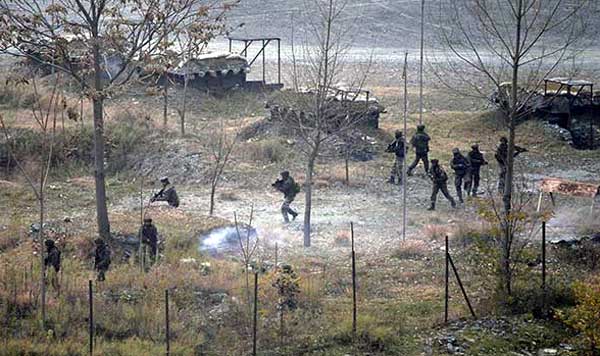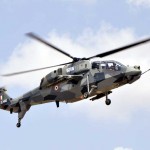IDR Blog
Will India Retaliate !!!

India is in deep trouble. It has positioned itself as a country vulnerable to threats and blackmail of all sorts. This disallows it to retaliate against its enemies in any meaningful way.
The Pulwama attack has brought fore the need for India to retaliate against Pakistan and the terror outfits inside Pakistan. Given the fact that India has never retaliated inside Pakistan ever since the Kashmir insurgency started around 1985, and which speeded up after the hair of the Prophet Muhamad was reportedly stolen from the Hazratbal mosque in Kashmir[1], speaks volumes for the future action India may take.[2] Though there have been hundreds and thousands of cross border infiltrations from the Pakistan side, India has always sought and chosen to combat the terror inside its territory. India has thus chosen to make its internal territory, Kashmir, the veritable battlefield that drains Pakistan as much as it drains India. Many would feel this is negative thinking on the part of India. Who makes their own territory a battlefield? But India does. Even USA keeps its wars positioned in East Asia and Europe and Middle East, far away from its shores, insulated by two large oceans.
India never retaliated militarily even when its Parliament was attacked, and did not cross the LOC en masse during the Kargil war. This is a sign of events to come with leaders like ours. Why has India not truly retaliated ever, and how will India respond this time? Let’s take the second question first.
The Nature of India’s Response
India will respond firmly in many ways, but it is unlikely it will respond militarily, though I would like to be surprised. The ways it will respond strongly are as follows:
- India will remove Pakistan from the most-favored nation status
- India will recall its ambassador from Pakistan
- India will raise tariffs on Pakistani goods brought into India
- India will raise the question of Pakistani terrorism in the United Nations
- India will send delegations to great powers seeking their support
- India will ask nations to place Pakistan on the black list of terrorism, hoping for them to stop financing Pakistan or having trade with Pakistan
- India will ask China to not block MasoodAzhar from being placed on the UN terror list
- India will ask USA to step up its diplomacy on the matter; the USA will oblige to a limited extent.
- India will threaten Pakistan with retaliation
- India will refuse to talk to Pakistan on this issue or any other
- The Indian Prime Minister will ask the Army Chief (probably through the Defense Minister) to prepare for retaliation; the army will oblige and prepare a few attack scenarios for discussion; those scenarios will be discussed and discussed by the top brass and ministers; the bureaucrats will offer the greatest resistance by interrogating and analyzing those scenarios to death. As such, the Indian army will suffer its first blow and demoralization in the matter.
- The GOI will place Indian para-military and border security forces on higher alert[3].
- The army will be asked to be prepared for any eventuality.
- India will roar like a lion and thump its chest as a war drum.
- The Pulwama attack will be discussed for days in the media and in articles and drawing rooms. Friends of military families will visit their military friends to find out the latest news. The hype will continue for weeks
Item (m) above will tend to put some fear into the enemy, but it is designed more for internal consumption. No military reaction is likely.
The Real Drift and Reason
I guess you get the drift: India will do everything it can to firmly respond, except attack Pakistan militarily. Prove me wrong, and I shall be happy, but I feel pessimistic that there will be a military response, or if there is, it will be too small to mean much, like another, small, surgical strike.
The real reasons behind India’s hesitation to launch a major offensive across the LOC are the following:
• Pakistanis threaten to bomb the oil refinery in Gujarat, which is only a missile throw away from Pakistan. This refinery reportedly contributes 5% of India’s GDP. It is much too much to lose, and theAmbanis may probably influence both the warring governments to the maximum extent they can. They definitely are in a favorable position to do so.
• India’s airforce is much too depleted. The airforce was scared to go into action in 1962; was recalcitrant during the Kargill war; and has lost more planes and pilots in peacetime accidents than in war. Its available strength is effectively at 22 squadrons, many of which are flying coffins from the 1960s. The IAF shows off its tiger’s teeth, but fails to pounce on or bite its prey. The Indian ministers know of this weakness and feel diffident on this count. But, they are much too busy spending our money on projects that will get them reelected rather than spending money on the nation’s honor.
• The Indian army is scared of a prolonged war owing to ammunition shortages, lack of good rifles, and inability to fight a prolonged war owing to fuel supply interruption. But, their music band is great, and they can beat the war drums to the loudest.
• The Pakistanis know of the hawala transactions[4] of every Indian, including the influential Indian ministers. They only have to make a threatening phone call to divulge the real story of their secret bank accounts overseas that the Indian ministers forget about going to war altogether. It is for this same probable reason that Indian ministers serve to keep Indian forces depleted of armaments. So much for the reality of India.
• Indians still believe that going to war is immoral because violence of any sort is immoral. Hence, the only time they should use violence is to defend themselves. This explains exactly why India has been on the defensive against external aggression for its whole life since 1947.
• India is simply scared to fight a war on its borders because it cannot determine the outcome of it, and so is distressed by the uncertainty. It is too bad that India has not the strength to steer an agenda or control its military battles.
• India’s military experience is against stone-throwing Kashmiris and grenade launching internal Naxalites. India knows this isn’t real military experience. In fact, this type of experience breeds cowardice itself.
• India is terribly deterred by Pakistani nukes, not realizing that Pakistani deterrence is a myth.[5]
• India is scared of Chinese threats up to its eyeballs.
• India is scared that Pakistan already has nukes positioned in Indian cities. Thus, India will be forever beholden to Pakistan at this rate.
However, in diplomatic battles, India can show off its wit; in blocking commerce, India can show off its savviness; in adopting legal arguments, India can prove its debating talent. But, these win no territory, kill no terrorist, and fend off no future terrorist attacks. Till now, these shallow tactics have not stopped the ISI from waging war against India.
The Surgical Strikes
The surgical strikes a couple of years ago – one in the territory of Myanmar and one inside Pakistan gave the world and Indians the impression that India meant hard business. However, my take on it, after reading tens of articles on it, is that the surgical strikes were no doubt surgical, but that they barely penetrated the skin. When you insert the knife into an enemy, it must go to its heart, not merely scratch the skin.
I could pull off such minor attacks daily, 365 days a year. But, the penetration into enemy territory was so little – and in one case was reported to be only half a mile into Pakistani territory — that I considered that equivalent to a person doing nothing more than putting their toe into the swimming pool rather than swimming, but claiminglater that they “went into the pool.” In addition, the multiple versions of the surgical strikes, with no proven authenticity or video released, and with only nodding heads making others nod, was quite suspicious[6].
For a strike that is half a mile from the border, one doesn’t even need to cross the border. An artillery barrage, or air missiles launched from 20 miles away would suffice. Yet, India calls that “crossing the LOC.” This is not the language or action of lions and bulls, but of foxes and rabbits. Such is not the action of men of courage or men of honor.
That there were no follow ups after the surgical strikes also point to the fear that the Indian government probably feels. In all dictionaries, this is the first sign of cowardice, by definition.
Can the Scare be Overcome?
Yes, it can, but I don’t see it happening any time soon. If the scare is overcome, and India adopts the model of an eye for an eye and a tooth for a tooth, there would be some progress on the honor and pride front. Too few feel proud to be Indians. To be galvanized into patriotism, India needs real military victories, not surgical strikes merely half a mile or less from the border. Mere brainy words don’t restore pride. Only the implementation of brawn gives a people the sense of security, honor and true pride.[7]
Show me Wrong
Dear Prime Minister Modi – prove me wrong by taking actions such as scuttling the Pakistani Navy and destroying every naval ship they have: use the Indian navy and airforce in joint operations for doing so. And, destroy all their power stations so that they can’t pump fuel into their airplanes and military vehicles: use the special forces and missiles for doing so. Use disproportionate retaliation in every way. Take out twelve teeth for one, and chop off the head for an eye. Restore my faith in India.
[1] But which mysteriously re-appeared after a few days.
[2] More in a bit on the so-called “surgical strikes” later in the article, and whether it can really be termed as true retaliation.
[3] This heightened tightening will make it easier for corrupt elements of border forces to smuggle drugs and contraband without civilian oversight or scrutiny.
[4] Because the hawala trade is firmly controlled by the ISI, since most of it goes through Dubai.
[5]The Myth of Nuclear Deterrence, by Amarjit Singh, CLAWS Journal, Winter 2009.
[6] Not to say that the surgical strikes didn’t occur, but that they were too small a response.
[7] Of course, the brawn of today requires technological prowess, which requires brains. But, at the end of the day, the enemy must be in the dust.
Post your Comment
4 thoughts on “Will India Retaliate !!!”
 Loading Comments
Loading Comments




There is a saying that goes “no gain no pain” & “friends in need are friends indeed” & “where there is a Will there are always ways” “positivity & truth always wins Vs negativity & lies”. The universe is a combination of space, time & energy where everything works in the correct order. Civilised World Vs Evilised World.
But I still think Sir public pressure and expectations after Surgical strike are much higher and the kind of statements Modi has made I think India will retaliate militarily for sure. How and When is only question…
Can some body be more negative?
We have to weed out our enemies inside.
seal border.
control e- & print media.
make j&k another state of the country in all respect.
the entire nation has to rise to the occasion & remain together in this operation.
Excellent article. Reveals true scenario.
Now the question is should we learn from it?